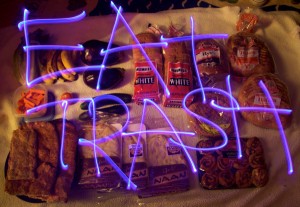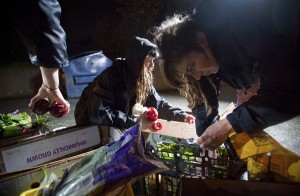In a country where people are starving the majority of Americans are throwing away their food. Approximately 25% of the food purchased ends up in landfills as 25 million tons of waste. While working at Denny’s as a graveyard shift waitress, I would see pounds of food tossed out daily. Till one night in 2008 when I met – the freegans.
Now this Denny’s was located in Boulder, Colorado, a town known for alternative lifestyles. I was outside smoking when a group of long-haired hippies skipped the restaurant and made their way towards the dumpster. They filled bags with almost-bad produce, bread still in the packaging and coffee beans that were expired. Almost every night there would be a group digging through the trash looking for gold.
Freeganism is a social movement where people live off of our food waste. This is not just a cause accepted by the fringes of society. It is changing the way view of food and our impact on the environment. They are on a mission to save the planet and it does not mean compromising for quality. What it does involve is a passion for trash and a creative approach to cooking. Frugan Living is a blog that categorizes the thousands of dollars of rescued food and provides tips, like freezing almost spoiled fruit, to make the seasonal items last. Recipes like Savenger’s Pie, a makeshift Shepard’s pie, include nontraditional ingredients like kale and corn. Freegans do not make a grocery list for a meal, but allow the ingredients to plan it!
One blogger, Cathy Erway recently wrote a cookbook, The Art of Eating In, chronically her journey through the underground world of DIY food. Abandoning high –priced restaurants, she experimented with park foraging and dumpster diving. She discovered communities that thrived without purchasing food. Erway spent less money, reduced her waste production and spent more time with people.
When people thinking of eating dumpster food they assume it will be poisonous and disgusting. But freeganism has sparked higher aspirations. Maximus Thaler, a Tufts University senior, is planning on turning waste into wealth by looking through Boston dumpsters. Dented packages, cartons of eggs with one cracked or dairy that just expired is being salvaged with the hopes of being served to paying customers. Freeganism might be a response to the mass consumption and waste in America, but it could possibly change how we eat and take care of our planet. It also has impacted publishing by taking what some consider “homeless survival skills” and transforming them into vegan cooking tips.



2 comments for “Food’s Anarchists: Helping your wallet and our planet”